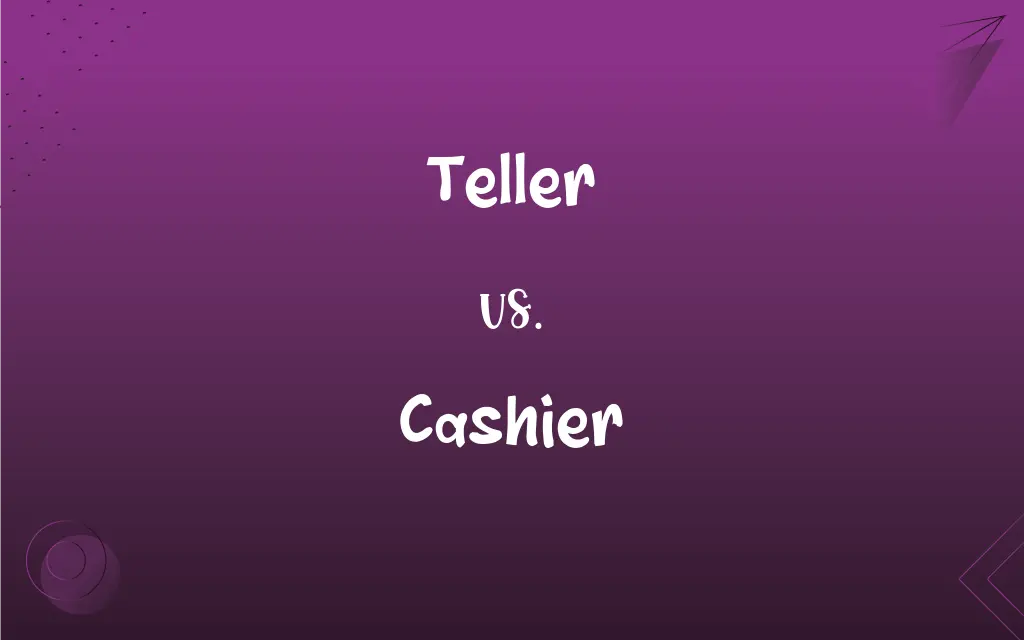Teller vs. Cashier: What's the Difference?
Edited by Aimie Carlson || By Janet White || Published on January 13, 2024
A teller typically works in a bank handling financial transactions, while a cashier handles payments and receipts in various retail or service establishments.

Key Differences
Tellers are primarily found in banks and are responsible for handling various banking transactions such as deposits, withdrawals, and account inquiries. Cashiers, on the other hand, are commonly employed in retail stores, restaurants, and other commercial settings, and their main responsibility is to handle customer payments, give change, and manage receipts. While both interact with customers and handle money, tellers focus more on banking services, and cashiers on sales transactions.
The role of a teller often requires knowledge of banking products and services, including loans, mortgages, and investment accounts. In contrast, cashiers are typically more focused on the accurate processing of sales transactions and may also handle product returns or customer inquiries related to the purchase process. Tellers need a deeper understanding of financial services, whereas cashiers require skills more aligned with customer service and sales operations.
In terms of equipment and software, tellers often use specialized banking systems to access customer accounts and process transactions. Cashiers, however, usually work with point-of-sale (POS) systems, cash registers, and sometimes inventory management systems. The technology used by tellers is more centered on banking operations, while cashiers' tools are designed for retail or commercial sales environments.
From a security standpoint, tellers handle more significant monetary transactions and are therefore more deeply involved in fraud detection and financial security measures. Cashiers also deal with security concerns, especially regarding cash handling and counterfeit detection, but these are typically on a smaller scale compared to those in banking. Both positions require a high level of trust and integrity, but tellers have a greater focus on banking security protocols.
Career development paths for tellers and cashiers can also differ. Tellers may advance to other banking roles, including personal or business banking advisors. Cashiers, on the other hand, might move into supervisory roles within retail or customer service, or branch into other areas of business operations. Career progression for tellers is more aligned with the financial sector, while cashiers have a broader range of industries for potential advancement.
ADVERTISEMENT
Comparison Chart
Primary Work Location
Banks
Retail stores, restaurants, service establishments
Main Responsibilities
Handling deposits, withdrawals, account inquiries
Processing payments, managing receipts, giving change
Required Knowledge
Banking products, financial services
Sales transactions, customer service
Tools and Equipment
Banking systems, transaction processing software
Point-of-sale systems, cash registers
Career Progression
Advancement within banking and financial services
Supervisory roles in retail or customer service
ADVERTISEMENT
Teller and Cashier Definitions
Teller
A teller is a bank employee who handles customer transactions and inquiries.
The teller assisted me with my account withdrawal.
Cashier
A cashier issues receipts and gives back correct change.
The cashier handed me the receipt along with my change.
Teller
A teller provides information on bank services and products.
The teller explained the different savings account options.
Cashier
A cashier handles the exchange of goods or services for payment.
The cashier rang up my groceries and provided the total cost.
Teller
Tellers are responsible for managing cash, checks, and other financial documents.
The teller counted the cash twice before handing it over.
Cashier
Cashiers can handle product returns and customer inquiries at the point of sale.
The cashier processed the return of my defective product.
Teller
A teller plays a key role in maintaining customer relations in a bank.
The friendly teller made my banking experience pleasant.
Cashier
Cashiers operate cash registers and process credit card transactions.
The cashier efficiently processed the long line of customers.
Teller
Tellers often assist in resolving account-related issues.
I spoke to the teller about the error in my bank statement.
Cashier
In many settings, the cashier is the final point of customer interaction.
The cashier wished me a good day as I left the store.
Teller
One who tells
A teller of tall tales.
Cashier
The officer of a bank or business concern in charge of paying and receiving money.
Teller
A bank employee who receives and pays out money.
Cashier
A store employee who handles cash transactions with customers.
FAQs
What is a bank teller?
A bank teller is an employee who handles customer transactions like deposits and withdrawals.
What is a cashier?
A cashier is someone who handles payments and receipts in retail or service settings.
Can tellers help with account problems?
Tellers often assist customers with various account-related issues.
Do tellers need banking knowledge?
Yes, tellers require knowledge of banking services and products.
What are typical cashier duties?
Typical duties include processing sales, giving change, and issuing receipts.
What technology do cashiers use?
Cashiers commonly use point-of-sale systems and cash registers.
What skills are important for a cashier?
Key skills for cashiers include customer service and accurate money handling.
How do tellers handle large transactions?
Tellers follow strict protocols for handling and verifying large transactions.
Can cashiers advance in their careers?
Cashiers can advance to supervisory roles or other positions within retail.
Do tellers receive specialized training?
Tellers usually receive training on banking systems and customer service.
What financial services can tellers provide?
Tellers can provide information about accounts, loans, and other banking services.
What is the typical attire for a cashier?
Cashier attire varies but often includes a uniform or business casual wear.
What is the difference in work environment for tellers vs. cashiers?
Tellers work in banks, while cashiers work in various retail and service environments.
Do cashiers handle returns and exchanges?
Yes, cashiers often handle product returns and exchanges.
Are tellers responsible for fraud detection?
Tellers play a role in detecting and preventing fraudulent activities.
Is customer interaction important for cashiers?
Yes, cashiers frequently interact with customers and provide service.
Can tellers help with online banking issues?
Tellers can often assist with basic online banking inquiries and issues.
How do tellers contribute to customer satisfaction?
Tellers contribute by providing efficient, accurate, and friendly service.
What hours do cashiers typically work?
Cashiers' hours can vary greatly, often including weekends and evenings.
Are tellers involved in selling banking products?
Tellers may inform customers about banking products but typically do not focus on sales.
About Author
Written by
Janet WhiteJanet White has been an esteemed writer and blogger for Difference Wiki. Holding a Master's degree in Science and Medical Journalism from the prestigious Boston University, she has consistently demonstrated her expertise and passion for her field. When she's not immersed in her work, Janet relishes her time exercising, delving into a good book, and cherishing moments with friends and family.
Edited by
Aimie CarlsonAimie Carlson, holding a master's degree in English literature, is a fervent English language enthusiast. She lends her writing talents to Difference Wiki, a prominent website that specializes in comparisons, offering readers insightful analyses that both captivate and inform.































































